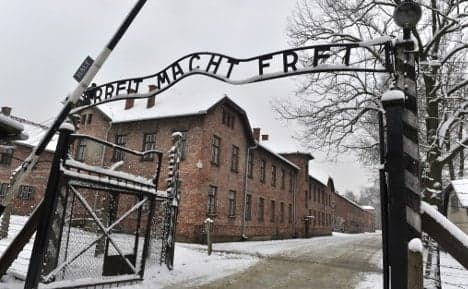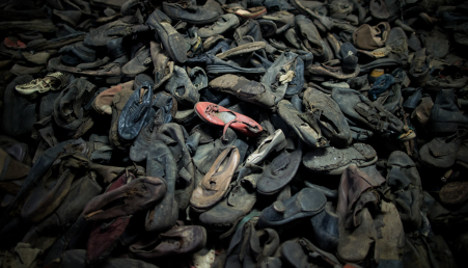Germany remembers horror of Auschwitz

Chancellor Angela Merkel joined survivors of the Auschwitz-Birkenau concentration camp in Berlin on Monday to open a series of events dedicated to the end of the Holocaust camp regime 70 years ago.
"We cannot forget. We owe that to the millions of victims," Merkel told the commemoration hosted by the International Auschwitz Committee.
Even today, the death camp still urged people not to heed "hatefilled slogans" against people who are looking for a new life in Germany, she added in apparent reference to growing right-wing agitation against immigrants and refugees.
On January 27th, 1945, Soviet troops liberated the infamous Nazi facility in Oswiecim, southern Poland. More than 1.1 million people were murdered here from 1940-45, including one million Jews.
Today, the liberation date is commemorated as International Holocaust Remembrance Day.

On Tuesday, around 300 former inmates, including 100 from Israel, are due to attend ceremonies at the site, along with German President Joachim Gauck and a dozen other world presidents and prime ministers.
"It is the last big anniversary that we can commemorate" with a large group of survivors, Piotr Cywinski, director of the museum at the site of the former death camp, said on its website.
"Their voices became the most important warning against the human capacity for extreme humiliation, contempt and genocide.
"However, soon it will not be the witnesses of those years, but us, the post-war generations, who will pass this horrible knowledge and the crushing conclusions that result from it."
The death camp that survived
The largest and deadliest of all Nazi Germany's death and concentration camps, Auschwitz-Birkenau consisted of three main camps and 45 satellite camps.
While most of the victims were Jews, tens of thousands of Poles, Romani and Sinti, Soviet prisoners of war, homosexuals and other minorities and nationalities also died there.
Many who were not killed in the gas chambers died of starvation, forced labour, infectious diseases, individual executions and medical experiments.
But while other death camps in Poland were razed by the retreating Nazis, ruins of the gas chambers, crematoriums and prisoner barracks at Auschwitz-Birkenau are still visible today.
Poland has created a special €120-million fund to preserve the site. Germany financed half of the fund, expected to provide up to €5 million per year over the next quarter century for its upkeep.
Lessons for today's world
Gauck and Merkel also met on Monday with a group of young people in the Bundestag to discuss the events of 70 years ago and their relevance in today's world, where anti-Semitism is rising again, including in Germany, and minorities are still persecuted worldwide.
While the horrors of the Holocaust are engrained in Germans from childhood through education, there has been a gradual shift in perceptions over the last 25 years about events of the 1940s.

According to a 2014 study by the Bertelsmann Foundation, 58 percent of Germans want to draw a firm line under the Holocaust, compared to only 22 percent of respondents in Israel.
Meanwhile, amid rising tensions over immigration, asylum seekers and the perceived creeping Islamization of Germany, the number of people who found the Holocaust relevant today has risen from 20 to 38 percent since a similar survey was conducted 25 years ago.
Meanwhile, 68 percent of Israelis today regard Germany more positively than ever before.
The admiration is not entirely mutual, however: 50 years after the resumption of diplomatic relations between the countries, 48 percent of Germans have negative feelings about Israel, rising to 54 percent among 18-29 year-olds.
Much of this is due to the Israeli actions against the Palestinians, and 62 percent of Germans now reject the policy of the Israeli government.
Comments
See Also
"We cannot forget. We owe that to the millions of victims," Merkel told the commemoration hosted by the International Auschwitz Committee.
Even today, the death camp still urged people not to heed "hatefilled slogans" against people who are looking for a new life in Germany, she added in apparent reference to growing right-wing agitation against immigrants and refugees.
On January 27th, 1945, Soviet troops liberated the infamous Nazi facility in Oswiecim, southern Poland. More than 1.1 million people were murdered here from 1940-45, including one million Jews.
Today, the liberation date is commemorated as International Holocaust Remembrance Day.

On Tuesday, around 300 former inmates, including 100 from Israel, are due to attend ceremonies at the site, along with German President Joachim Gauck and a dozen other world presidents and prime ministers.
"It is the last big anniversary that we can commemorate" with a large group of survivors, Piotr Cywinski, director of the museum at the site of the former death camp, said on its website.
"Their voices became the most important warning against the human capacity for extreme humiliation, contempt and genocide.
"However, soon it will not be the witnesses of those years, but us, the post-war generations, who will pass this horrible knowledge and the crushing conclusions that result from it."
The death camp that survived
The largest and deadliest of all Nazi Germany's death and concentration camps, Auschwitz-Birkenau consisted of three main camps and 45 satellite camps.
While most of the victims were Jews, tens of thousands of Poles, Romani and Sinti, Soviet prisoners of war, homosexuals and other minorities and nationalities also died there.
Many who were not killed in the gas chambers died of starvation, forced labour, infectious diseases, individual executions and medical experiments.
But while other death camps in Poland were razed by the retreating Nazis, ruins of the gas chambers, crematoriums and prisoner barracks at Auschwitz-Birkenau are still visible today.
Poland has created a special €120-million fund to preserve the site. Germany financed half of the fund, expected to provide up to €5 million per year over the next quarter century for its upkeep.
Lessons for today's world
Gauck and Merkel also met on Monday with a group of young people in the Bundestag to discuss the events of 70 years ago and their relevance in today's world, where anti-Semitism is rising again, including in Germany, and minorities are still persecuted worldwide.
While the horrors of the Holocaust are engrained in Germans from childhood through education, there has been a gradual shift in perceptions over the last 25 years about events of the 1940s.

According to a 2014 study by the Bertelsmann Foundation, 58 percent of Germans want to draw a firm line under the Holocaust, compared to only 22 percent of respondents in Israel.
Meanwhile, amid rising tensions over immigration, asylum seekers and the perceived creeping Islamization of Germany, the number of people who found the Holocaust relevant today has risen from 20 to 38 percent since a similar survey was conducted 25 years ago.
Meanwhile, 68 percent of Israelis today regard Germany more positively than ever before.
The admiration is not entirely mutual, however: 50 years after the resumption of diplomatic relations between the countries, 48 percent of Germans have negative feelings about Israel, rising to 54 percent among 18-29 year-olds.
Much of this is due to the Israeli actions against the Palestinians, and 62 percent of Germans now reject the policy of the Israeli government.
Join the conversation in our comments section below. Share your own views and experience and if you have a question or suggestion for our journalists then email us at [email protected].
Please keep comments civil, constructive and on topic – and make sure to read our terms of use before getting involved.
Please log in here to leave a comment.